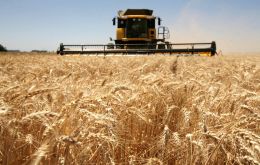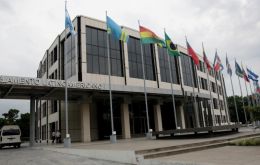MercoPress. South Atlantic News Agency
Tag: FAO
-
Saturday, May 14th 2022 - 19:58 UTC
Argentina wheat crop estimates for 2022/23 lowered, given fears of dry climate

Because of forecasted dry weather the Rosario Grains Exchange anticipates a lesser wheat crop in Argentina for the 2022/23 season. The Exchange projects Argentine wheat production to decline to 19 million tons, down from a record the 22.1 million tons in 2021-22, as a La Niña weather pattern is expected to reduce rainfall in the coming months.
-
Saturday, May 7th 2022 - 09:22 UTC
World food commodity prices decreased slightly in April, FAO report

World food commodity prices decreased in April after a large jump the previous month, led by modest declines in the prices of vegetable oils and cereals, the Food and Agriculture Organization of the United Nations (FAO) reported.
-
Wednesday, May 4th 2022 - 10:08 UTC
Parlatino urges member countries to tackle ballooning food prices

The Latin American and Caribbean Parliament (Parlatino) Tuesday urged its 23 member countries to take measures to curb the soaring food prices which are reaching unprecedented highs, according to the food price index kept by the Food and Agriculture Organization of the United Nations (FAO).
-
Sunday, March 20th 2022 - 14:32 UTC
Brazil strongly campaigning to have fertilizers delisted from sanctions

Brazil has called for fertilizers to be excluded from the list of sanctions currently imposed as a consequence of the Russian invasion of Ukraine and ongoing fighting. Agriculture Minister Tereza Cristina Costa Dias addressing a virtual meeting of peers from countries of the Americas, including the United States, pointed out limiting or banning fertilizer trade has a direct impact on farming productivity, food availability, boosts food prices and threatens food security, mainly among the most vulnerable countries.
-
Tuesday, March 15th 2022 - 09:50 UTC
Mercosur and associate members want fertilizers off Russia's sanctions list

Mercosur country members plus associate Chile and Bolivia (in the process of joining the block) want fertilizers excluded from the list of sanctions on Russia, according to Brazilian Agriculture minister Tereza Cristina da Costa Dias.
-
Tuesday, March 8th 2022 - 09:11 UTC
FAO food price soars in February but profit margins are squeezed by energy, fertilizer and feed costs

The benchmark gauge for world food prices went up in February, reaching an all-time high, led by vegetable oils and dairy products, the Food and Agriculture Organization of the United Nations (FAO) has reported.
-
Wednesday, February 9th 2022 - 09:27 UTC
World food prices rebounded in January with strong demand for vegetable oils, FAO report

The gauge for world food prices went up in January, largely catalyzed by supply-side constraints for vegetable oils, the Food and Agriculture Organization of the United Nations (FAO) reported. The FAO Food Price Index averaged 135.7 points in January, 1.1 percent higher than in December. The Index tracks monthly changes in the international prices of commonly-traded food commodities.
-
Friday, December 10th 2021 - 07:00 UTC
November marked a further increase in FAO's Food Price Index, 27,3% from a year earlier

The FAO Food Price Index (FFPI) averaged 134.4 points in November 2021, up 1.6 points (1.2 percent) from October and 28.8 points (27.3 percent) from November 2020.
-
Wednesday, December 1st 2021 - 09:46 UTC
Famine takes a grip of Latin America and the Caribbean

A United Nations official from the Food and Agriculture Organization (FAO) Tuesday announced famine in Latin America and the Caribbean had increased at a higher rate compared to other regions in the world during the COVID-19 pandemic.
-
Saturday, November 6th 2021 - 09:30 UTC
October FAO's food price index at its highest since July 2011

The world food price barometer surged to a new peak reaching its highest level since July 2011, the Food and Agriculture Organization of the United Nations (FAO) reported.
